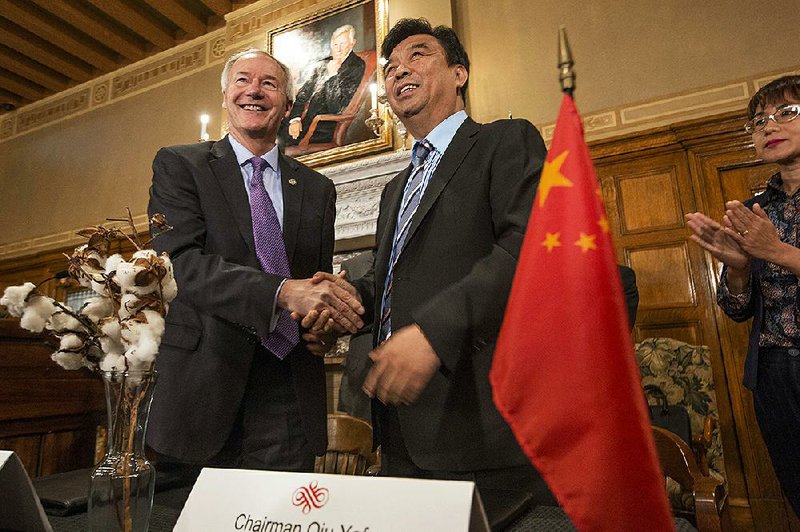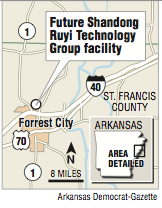A Chinese textile manufacturer will hire up to 800 workers at a new plant in Forrest City while also promoting Arkansas-grown cotton, Gov. Asa Hutchinson and leaders of the company announced Wednesday.
Hourly wages will start at $15.25, helping a region that has been struggling for years with losses in both population and jobs, Hutchinson said at a news conference at the state Capitol. He was joined by Yafu Qiu, chairman of Shandong Ruyi Technology Group, and a translator.
Based in the Shandong province of China, the company will spend $410 million renovating a plant formerly used by Sanyo Manufacturing Corp. Workers there produced microwaves and televisions for some 30 years until Sanyo closed the plant in October 2007. Some 300 workers lost their jobs then. Another 350 had lost their jobs through layoffs some months before the closing.
Workers at the new Forrest City plant will process more than 200,000 tons of Arkansas cotton each year, spinning it into yarn for textiles to be manufactured later elsewhere. Arkansas farmers last year planted 375,000 acres of cotton and harvested 840,000 bales. A bale contains about 500 pounds of cotton.
Renovation of the Sanyo facility -- a complex comprising four buildings totaling 1.4 million square feet on 161 acres just north of Interstate 40 in Forrest City -- will begin this fall. Production is expected to start in mid-2018. The Chinese company bought the property for $5.75 million.
The state is providing up to $4 million in cash incentives and $11 million in payroll rebates. The payroll rebates will kick in after the first 400 workers are hired. The company also can receive refunds on sales taxes paid on building materials and on taxable machinery and equipment.
Local incentives amount to about $1 million.
Hutchinson said attracting industry to the Delta has been a focal point of his administration since his election in 2014. Hutchinson touted the news as the Delta's "largest jobs announcement" in recent history.
"This is not only great for Arkansas, but it's going to give an economic boost to a region that deserves it and has worked very hard for it," Hutchinson said.
In January 2013, Big River Steel announced that it would hire 525 people at its new steel mill in Osceola, near the Mississippi River. Years before, Nucor opened a series of steel mills, creating 1,600 jobs in Mississippi County.
The statewide unemployment rate in March was 3.6 percent, a record low. But in St. Francis County, the rate was 4.8 percent. Neighboring rates were 5.1 percent in Woodruff County, 4.7 percent in Lee County, 4.3 percent in Crittenden County and 4.3 percent in Monroe County.
"We keep referring to the old Sanyo building, but now it's known as the new Ruyi facility," said Mike Preston, executive director of the Arkansas Economic Development Commission.
Through his translator, Qiu (pronounced 'chew') said the Arkansas plant is his company's first investment in North America. As for why the company "parachuted" into Arkansas, he acknowledged not knowing much about the state but praised it for its "spirit." Qiu said he worked with "the right people with the right vision to make things happen."
Shandong province, he said, is known as the home of Confucius, the Chinese philosopher. Confucius, Qui said through his translator, "knew how to make a better future."
Bill Robertson, a cotton agronomist with the University of Arkansas System's Agriculture Division, said cotton farmers will be happy to hear the news.
"If you look at U.S. cotton, about 80 percent gets put on a boat and shipped somewhere else," Robertson said. "If we can process that cotton here, turning it from a raw product to a finished product, and create those jobs here, those dollars get turned over here and will do nothing but help our economy. A 'cotton dollar' will always go further than a 'green dollar' because so many products, jobs and livelihoods are tied to that 'cotton dollar.'"
In Shandong and other places where it has textile plants, the company manufactures worsted-woolen goods such as overcoats, suits and jackets and leather goods such as shoes and belts.
Shandong Ruyi Technology Group has bought French and British apparel manufacturers in recent years, Qui said.
Kay Brockwell of Jonesboro, a longtime economic development leader who now has her own consulting firm, worked with state officials in drawing Ruyi to Forrest City. After Wednesday's news conference, she recalled getting the first telephone call about the company's interest in the Sanyo property in September 2015.
"Then the talks really slowed down," she said. "I'm just really happy for the people in and around Forrest City and for the farmers who'll have an Arkansas market for their cotton."
Shandong Ruyi Technology Group is the fourth Shandong-based company to announce jobs in Arkansas. The others are a pulp mill near Arkadelphia in Clark County, a garment factory in Little Rock and a plant in Danville to manufacture dog treats.
Wednesday's announcement could lead to more news from Shandong province, Hutchinson hinted. "We're known to the[textile] industry there," he said.
A Section on 05/11/2017

